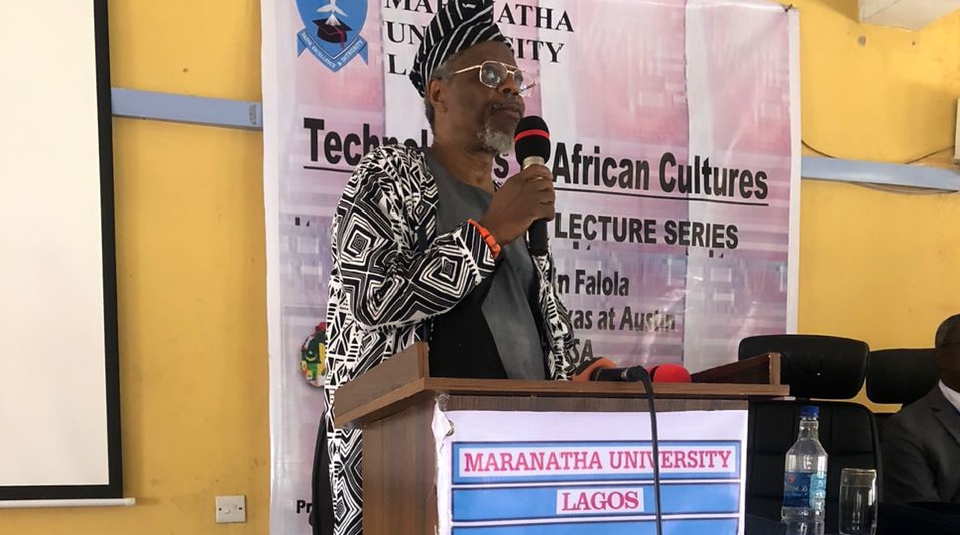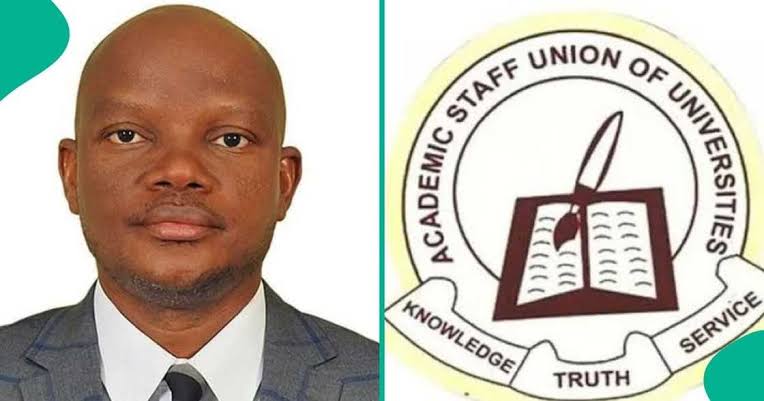
Professor of African History, Toyin Falola, has tied the revival of fading African traditions and customs to the ingenuity and ubiquity of digital platforms.
The erudite professor of history made this known on Tuesday while delivering the First Distinguished Lecture of the Maranatha University, Lagos.
Falola is the Jacob and Frances Sanger Mossiker Chair in the Humanities, and University Distinguished Teaching Professor at The University of Texas at Austin. He is also Fellow of the Nigerian Academy of Letters and Fellow of the Historical Society of Nigeria.
In his lecture titled: “Technologies and African Cultures”, Falola maintained that there is a beneficial interconnectedness between fading African traditions and customs and the diverse benefits that the digital age offers, insisting that modern technologies have helped in the preservation of diverse range of African cultural practices.
“In the modern era, we bear witness to the significant influence of technology on the maintenance and propagation of a diverse range of cultural practices, languages, and traditions. The use of digital platforms, in collaboration with cultural institutions like museums and online archives, is proving to be an efficient means of reviving fading customs and, at the same time, supporting efforts aimed at the preservation of languages and the promoting their revival. The economic dimension is equally important as the other aspects. Currently, the ecosystem of technology startups in African continent is experiencing an unprecedented expansion, serving as a driving force to promote the growth of innovative and entrepreneurial efforts on the continent. It is becoming widely acknowledged that technology plays an important role in fostering economic growth. This is due to the opportunities it presents for environmentally sustainable development and the incorporation of environmental considerations.” he said.
He, however, warned that these technical developments do not exist in a vacuum, adding that “they bring their own set of inherent challenges and complexities. The investigation described above focuses on the complex interactions between traditional cultural norms and modern technical breakthroughs, and how these interactions contribute to the exacerbation of existing access disparities in accessing technological resources across various African locales. In this era of widespread digitalisation, it is imperative to give careful attention to the moral questions that arise from concerns over data privacy and protection.”
He equally noted the role of technology in Africa’s fight against colonial rule. According to him, “it is essential to acknowledge the pivotal role of technology in Africa’s quest for emancipation from colonial domination. The utilisation of indigenous technologies, such as the telegraph, played a central role in facilitating resistance efforts and disseminating vital information. Furthermore, it is noteworthy to acknowledge the substantial advancements that African nations have made in various sectors, particularly in telecommunications. Pioneering innovations, such as mobile banking and mobile health, have emerged as transformative forces, significantly influencing the lives of individuals throughout the continent. In contemporary times, African nations are wholeheartedly embracing digital technologies, displaying a fervent enthusiasm to their adoption and integration. The global prevalence of mobile phone usage is characterised by remarkably high penetration rates. Furthermore, innovative solutions have emerged as effective means to tackle and overcome local challenges. In agriculture, mobile applications offer valuable tools that furnish farmers with real-time meteorological data and prevailing market rates. E-commerce platforms serve as a bridge, connecting artisans in remote areas with global markets, thereby promoting economic empowerment.”
He outlined the impact of technology on the various domains of human interactions, and the fallout of same in some instances. “The widespread availability of mobile banking services has significantly improved financial inclusion, thereby enabling individuals who were hitherto excluded from conventional banking systems to access essential financial services. Telemedicine is playing a pivotal role in enhancing healthcare accessibility within marginalised regions, and mobile applications are equipping farmers with essential information pertaining to meteorological conditions, market rates, and advanced agricultural methodologies.
“However, it is important to acknowledge that these positive aspects are not without their corresponding challenges. The expeditious process of digital transformation has raised concerns regarding the preservation of data privacy and security. The collection and retention of personal data raise questions about its use and protection. Moreover, the ongoing presence of the digital divide poses a substantial concern, characterised by disparities in internet connectivity between urban and rural regions, as well as among various socio-economic strata.
“From a cultural standpoint, the advent of modern technology has led to a convergence of customary and contemporary practices. Some individuals perceive this phenomenon as a viable means for preserving and advancing cultural heritage via digital methods, while others have concerns that it may gradually undermine conventional values and customs.
“The integration of cutting-edge technological solutions in Africa has precipitated several consequences, including both positive and negative effects that affect diverse facets of the society. To grasp the profound transformative potential of these technological solutions, it becomes imperative to examine specific instances that illustrate their consequential impacts.
“The healthcare exhibits a conspicuous presence of favorable outcomes. Mobile health, often referred to as mHealth, has experienced notable progress in enhancing the accessibility and provision of healthcare services. In situations where healthcare resources are limited in rural regions, telemedicine platforms facilitate remote consultations, diagnoses, and prescription delivery through mobile devices. This development has played a pivotal role in mitigating disparities in healthcare access and effectively reaching marginalised populations, thereby yielding life-saving outcomes.
“In education, e-learning platforms have effectively promoted the democratisation of access to high-quality education. The advent of smartphones has made digital learning resources widely available, enabling students throughout Africa to partake in remote education. This phenomenon has the potential to mitigate disparities in educational access and equip young individuals with indispensable competencies for the labor market.
“Moreover, the advent of financial technology (fintech) is fundamentally transforming the structure and operations of the financial sector. The introduction of mobile banking and digital payment platforms has significantly expanded the accessibility of financial services, allowing individuals who were previously excluded from the banking system to securely save, borrow, and conduct transactions. This development possesses the capacity to boost economic growth through the cultivation of entrepreneurial activities and the promotion of financial inclusivity.
“In addition to the positive effects mentioned, it is essential to acknowledge the existence of challenges that require careful consideration. A significant concern pertains to the digital divide, results in noticeable disparities in internet accessibility between urban and rural regions and among various socio-economic strata. While technological solutions present promising prospects, there is a potential drawback of further marginalising underprivileged communities and exacerbating pre-existing disparities,” he said.
At the lecture were top academics from the university community, the university management which was led by the Vice Chancellor, Professor Rufus Akinyele, and members of the public.






